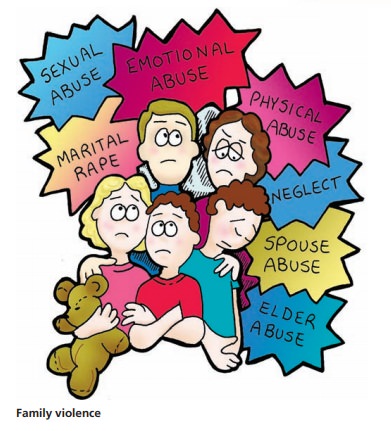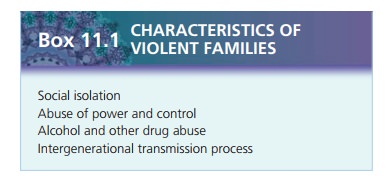Chapter: Psychiatric Mental Health Nursing : Abuse and Violence
Characteristics of Violent Families
CHARACTERISTICS OF VIOLENT
FAMILIES
Family violence encompasses spouse battering;
neglect and physical, emotional, or
sexual abuse of children; elder abuse; and marital rape. In many cases, family
members tolerate abusive and violent behavior from relatives they would never
accept from strangers. In violent families, the home, which is normally a safe
haven of love and protec-tion, may be the most dangerous place for victims.
Research studies have identified some common charac-teristics of
violent families regardless of the type of abuse that exists.

Social Isolation
One characteristic of violent families is social isolation. Members
of these families keep to themselves and usually do not invite others into the
home or tell them what is happening. Often, abusers threaten victims with even
greater harm if they reveal the secret. They may tell chil-dren that a parent,
sibling, or pet will die if anyone outside the family learns of the abuse. So
children keep the secret out of fear, which prevents others from “interfering
with private family business.”
Abuse of Power and Control
The abusive family member almost always holds a posi-tion of power
and control over the victim (child, spouse, or elderly parent). The abuser
exerts not only physical power but also economic and social control. He or she
is often the only family member who makes decisions, spends money, or spends
time outside the home with other people. The abuser belittles and blames the
victim, often by using threats and emotional manipulation. If the abuser
perceives any indication, real or imagined, of vic-tim independence or
disobedience, violence usually esca-lates. Twenty-two percent of nonfatal
violence against women is perpetrated by an intimate partner, compared with
only 3% of men injured by an intimate partner. Inti-mate partners are
responsible for one third of female homicides, whereas only 3% of male
homicides are com-mitted by a female intimate partner (Bureau of Justice
Statistics, 2007).
Alcohol and Other Drug Abuse
Substance abuse, especially alcoholism, has been asso-ciated with
family violence. This finding does not imply
· cause-and-effect
relationship. Alcohol does not cause the person to be abusive; rather, an
abusive person also is likely to use alcohol or other drugs. Two thirds of
victims of intimate violence report that alcohol was involved in the violent
incident. Women whose part-ners abused alcohol were 3.6 times more likely than
other women to be assaulted by their partners (Marin Institute, 2008). Although
alcohol may not cause the abuse, many researchers believe that alcohol may
diminish inhibitions and make violent behavior more intense or frequent.
Alcohol is also cited as a factor in acquaintance rape or date
rape. According to the Marin Institute (2008), 40% of convicted rape and sexual
assault offenders reported drink-ing alcohol at the time of their crime. In
addition, use of the illegal drug flunitrazepam (Rohypnol) to subdue potential
victims of date rape is on the rise in the United States (van der Kolk, 2005).
Intergenerational Transmission
Process
The intergenerational
transmission process shows that patterns of violence are perpetuated from
one generation to the next through role modeling and social learning (van der
Kolk, 2005). Intergenerational transmission suggests that family violence is a
learned pattern of behavior. For example, children who witness violence between
their parents learn that violence is a way to resolve conflict and is an
integral part of a close relationship. Statistics show that one third of
abusive men are likely to have come from violent homes where they witnessed
wife-beating or were abused themselves. Women who grew up in violent homes are
50% more likely to expect or accept violence in their own relationships. Not
all persons exposed to family vio-lence, however, become abusive or violent as
adults. Therefore, this single factor does not explain the perpetu-ation of
violent behavior.

Related Topics